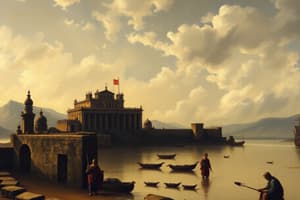Podcast
Questions and Answers
What is the longest river in the world that provided great irrigation for the lands along the banks?
What is the longest river in the world that provided great irrigation for the lands along the banks?
- Nile River (correct)
- Amazon River
- Ganges River
- Yangtze River
What type of rule was established under a pharaoh in ancient Egypt?
What type of rule was established under a pharaoh in ancient Egypt?
Unified rule
What are the two main methods through which a leader's rule can be enforced according to 'Coercion and Consent'?
What are the two main methods through which a leader's rule can be enforced according to 'Coercion and Consent'?
Force and religion
What does 'Social Stratification' refer to?
What does 'Social Stratification' refer to?
Where is the Indus River Valley located?
Where is the Indus River Valley located?
Who brought Hinduism to the Indus River Valley?
Who brought Hinduism to the Indus River Valley?
Who are the natives of the Indus River Valley?
Who are the natives of the Indus River Valley?
What significant interaction is referred to as the Vedic Age?
What significant interaction is referred to as the Vedic Age?
What are the Upanishads?
What are the Upanishads?
Match the following caste divisions with their corresponding roles:
Match the following caste divisions with their corresponding roles:
What is the concept of 'Dharma' in Hinduism?
What is the concept of 'Dharma' in Hinduism?
What practice is believed to provide a better reincarnation according to Hindu beliefs?
What practice is believed to provide a better reincarnation according to Hindu beliefs?
What is the sacred language of the Hindu faith?
What is the sacred language of the Hindu faith?
The pre-classical era lasted from ______ to ______.
The pre-classical era lasted from ______ to ______.
What is referred to as the Agricultural Revolution?
What is referred to as the Agricultural Revolution?
What are the results of the Agricultural Revolution?
What are the results of the Agricultural Revolution?
What does Mesopotamia mean?
What does Mesopotamia mean?
Who were the Sumerians?
Who were the Sumerians?
What does patriarchy refer to in early civilizations?
What does patriarchy refer to in early civilizations?
Who took over Mesopotamia after the Akkadians?
Who took over Mesopotamia after the Akkadians?
Who was Hammurabi?
Who was Hammurabi?
What are hieroglyphics?
What are hieroglyphics?
What is Harappa known for?
What is Harappa known for?
What are the Mahabharata and Ramayana?
What are the Mahabharata and Ramayana?
What is the Middle Kingdom in reference to?
What is the Middle Kingdom in reference to?
What is the Shang Dynasty known for?
What is the Shang Dynasty known for?
What does the Zhou Dynasty represent?
What does the Zhou Dynasty represent?
What is feudalism?
What is feudalism?
What is the Mandate of Heaven?
What is the Mandate of Heaven?
What are the takeaways from Egypt regarding governance?
What are the takeaways from Egypt regarding governance?
What were important takeaways from Mesopotamia?
What were important takeaways from Mesopotamia?
What did cultural diffusion lead to in India?
What did cultural diffusion lead to in India?
What were the main takeaways from China?
What were the main takeaways from China?
What did the Agricultural Revolution enable societies to do?
What did the Agricultural Revolution enable societies to do?
Study Notes
Nile River
- Longest river in the world, crucial for irrigation in Egypt.
- Forms the heart of ancient Egyptian civilization.
Egypt
- Unified under a pharaoh, offers strong natural defenses.
- Engaged in trade with neighboring nations.
Coercion and Consent
- Forces like religion used to ensure obedience to rulers.
- Exemplified by pharaohs and the Mandate of Heaven.
Social Stratification
- Hierarchical structure distinguishing wealth and societal roles.
Indus River Valley
- Located in modern-day Pakistan, features fertile land and natural defenses.
Aryans
- Indo-European nomadic tribe that introduced Hinduism to the Indus Valley.
Dravidians
- Indigenous people of the Indus River Valley.
Vedic Age
- Period marked by interaction between Aryans and Dravidians.
- Significant for sharing and producing the Vedas, including the Rig Veda.
Upanishads
- Philosophical texts that unify and outline Hindu beliefs.
Class Division - Caste System
- Society divided into four main classes: Priests, Warriors, Merchants, and Laborers.
Dharma
- Concept representing the ethical duty of each caste.
- Good performance yields positive karma and affects reincarnation.
Cremation
- Hindu practice believed to enhance the process of reincarnation.
Sanskrit
- Sacred language of Hinduism, used in Vedic texts.
Pre-Classical Era
- Spanning from 10,000 BCE to 500 BCE, marks early civilization development.
Agricultural Revolution
- Transition from nomadic hunter-gatherer societies to settled agricultural communities.
Results of the Agricultural Revolution
- Led to food surpluses, specialized labor, social stratification, and population increases.
Mesopotamia
- Known as "the land between the rivers"—Tigris and Euphrates.
Sumerians
- Early civilization that developed cuneiform writing, astronomical knowledge, and polytheistic beliefs around 3500 BCE.
Patriarchy
- Male dominance prevalent in early civilizations, shaping societal structures.
Babylonians
- Became dominant in Mesopotamia following the brief rule of the Akkadians.
Hammurabi and his Code of Law
- Babylonian king known for establishing legal codes focused on property rights and social order, favoring patriarchal norms.
Hieroglyphics
- Ancient Egyptian writing system, not as complex as cuneiform.
Harappa
- Advanced civilization in the Indus River Valley noted for its sophisticated urban planning and sanitation.
Mahabharata and Ramayana
- Epic literary works from the Vedic Age, significant to Hindu culture and philosophy.
Middle Kingdom
- Term for China, located between the Huanghe and Yangtze Rivers, contributing to its cultural identity.
Shang Dynasty
- Noted for advancements in silk manufacturing and bronze casting.
Zhou Dynasty
- Larger empire that contributed to political unity and stability, flourishing from around 1029 BCE.
Feudalism
- Hierarchical system granting nobles control over land while providing for serfs or lower classes.
Mandate of Heaven
- Concept used by the Zhou dynasty claiming divine right of emperors, justified removal through divine displeasure.
Takeaways from Egypt
- Achieved governance through coercion and a productive agricultural system.
Takeaways from Mesopotamia
- Polytheism and legal structures like Hammurabi's Code aimed at promoting equality among citizens.
Takeaways from India
- Cultural diffusion leading to the establishment of Hinduism as a major world religion.
Takeaways from China
- Stability maintained through feudalism and coercive strategies like the Mandate of Heaven.
Takeaways from the Agricultural Revolution
- Marked a significant shift in human activity, enhancing societal complexity and trade opportunities.
Studying That Suits You
Use AI to generate personalized quizzes and flashcards to suit your learning preferences.
Description
Prepare for your AP World History exam with this review quiz focusing on the Pre-Classical Era. Explore key concepts like the Nile River and the role of Egypt in ancient civilization. Test your knowledge on important terms and definitions that shaped early human history.




